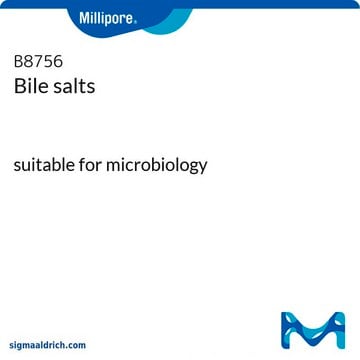30968
Sodium deoxycholate monohydrate
BioUltra, ≥99.0% (NT)
Synonym(s):
3α,12α-Dihydroxy-5β-cholanic acid sodium salt, 7-Deoxycholic acid sodium salt, Desoxycholic acid sodium salt
About This Item
Recommended Products
description
anionic
Quality Level
product line
BioUltra
Assay
≥99.0% (NT)
form
powder
optical activity
[α]20/D +44±2°, c = 2% in H2O
mol wt
average mol wt 1200-5000
aggregation number
3-12
impurities
insoluble matter, passes filter test
≤0.5% cholic acid (TLC)
≤6.1% water
pH
7.5-9.5 (25 °C, 0.1 M in H2O)
CMC
2-6
solubility
H2O: 0.1 M at 20 °C, clear, colorless
anion traces
chloride (Cl-): ≤50 mg/kg
sulfate (SO42-): ≤200 mg/kg
cation traces
Al: ≤20 mg/kg
Ba: ≤5 mg/kg
Bi: ≤5 mg/kg
Cd: ≤5 mg/kg
Co: ≤5 mg/kg
Cr: ≤5 mg/kg
Cu: ≤5 mg/kg
Fe: ≤5 mg/kg
Li: ≤5 mg/kg
Mg: ≤20 mg/kg
Mn: ≤5 mg/kg
Mo: ≤5 mg/kg
Ni: ≤5 mg/kg
Pb: ≤5 mg/kg
Sr: ≤20 mg/kg
Zn: ≤5 mg/kg
λ
0.1 M in H2O
UV absorption
λ: 260 nm Amax: 0.10
λ: 280 nm Amax: 0.08
HLB
16
SMILES string
O.[Na+].C[C@H](CCC([O-])=O)C1CCC2C3CCC4C[C@H](O)CC[C@]4(C)C3C[C@H](O)[C@]12C
InChI
1S/C24H40O4.Na.H2O/c1-14(4-9-22(27)28)18-7-8-19-17-6-5-15-12-16(25)10-11-23(15,2)20(17)13-21(26)24(18,19)3;;/h14-21,25-26H,4-13H2,1-3H3,(H,27,28);;1H2/q;+1;/p-1/t14-,15-,16-,17+,18-,19+,20+,21+,23+,24-;;/m1../s1
InChI key
NDVHNZISGVSFMP-WTCAICSISA-M
Looking for similar products? Visit Product Comparison Guide
General description
Application
Biochem/physiol Actions
Signal Word
Warning
Hazard Statements
Precautionary Statements
Hazard Classifications
Acute Tox. 4 Oral
Storage Class Code
11 - Combustible Solids
WGK
WGK 3
Flash Point(F)
Not applicable
Flash Point(C)
Not applicable
Personal Protective Equipment
Certificates of Analysis (COA)
Search for Certificates of Analysis (COA) by entering the products Lot/Batch Number. Lot and Batch Numbers can be found on a product’s label following the words ‘Lot’ or ‘Batch’.
Already Own This Product?
Find documentation for the products that you have recently purchased in the Document Library.
Customers Also Viewed
Our team of scientists has experience in all areas of research including Life Science, Material Science, Chemical Synthesis, Chromatography, Analytical and many others.
Contact Technical Service






